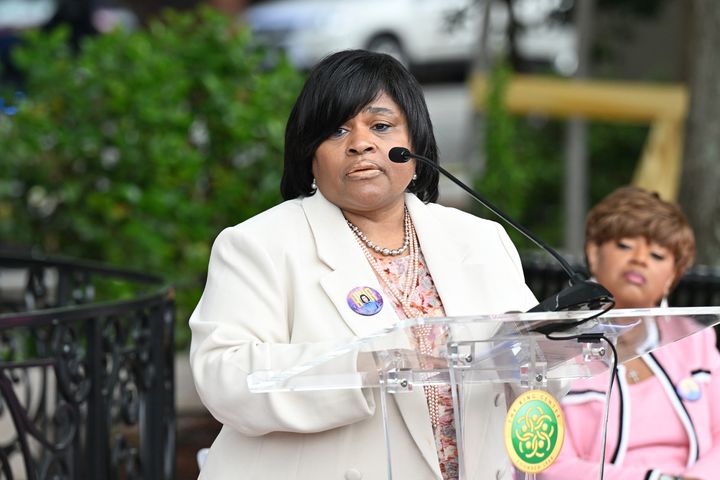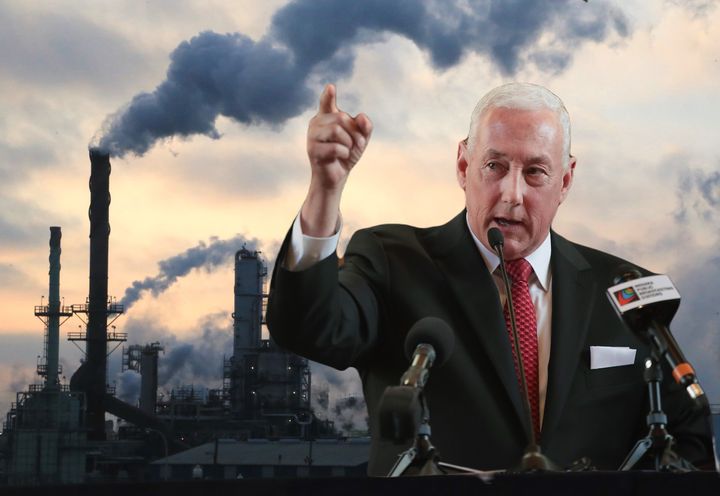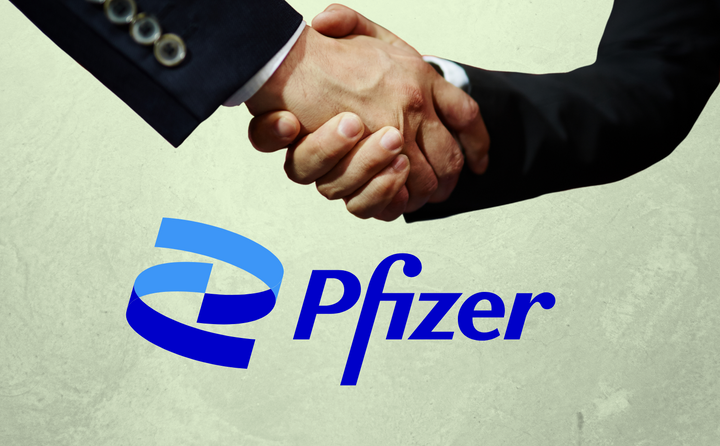A Lobbyist Raising Money for Biden Is Fighting Measures to Crack Down on Foreign Election Influence
Ken Jarin, who is raising money for Biden's campaign, leads Ballard Spahr’s government affairs operation, which lobbies for subsidiaries of foreign companies opposing efforts to improve lobbying transparency and prevent foreign election influence.

As former Vice President Joe Biden campaigns to become the chief executive of the United States government, he is getting help from someone who is working to block reforms aimed at reducing the influence of foreign corporations on U.S. elections and policymakers.
Biden’s first presidential campaign fundraiser this year, held in April at the Philadelphia home of Comcast’s top lobbyist, David Cohen, was hosted by a cast of Democratic Party high rollers including Ken Jarin, co-leader of government affairs at corporate lobbying firm Ballard Spahr. Among the clients of the lobbying team Jarin leads at Ballard Spahr is the Fair FARA Coalition, a mysterious trade group representing U.S. subsidiaries of major foreign companies. The coalition opposes proposals to make lobbyists for U.S. subsidiaries of foreign-owned companies register under the Foreign Agents Registration Act (FARA), which requires far more rigorous disclosure than domestic lobbying reports demand.
Former Pennsylvania Gov. Ed Rendell, special counsel in Ballard Spahr’s government relations and public policy division but not part of its Washington, D.C. lobbying team, also hosted the event. Cohen was formerly Rendell’s chief of staff and chair of Ballard Spahr.
In an email to potential donors, Cohen said that Jarin, Rendell, and former Ballard Spahr partner Charisse Lillie, now a vice president at Comcast, are part of a new “Philadelphia finance leadership team” he put together. Cohen encouraged those attending the fundraiser to contribute the maximum allowed amount of $2,800. On the day of the fundraiser, Biden raised $6.3 million.
In early January, Philadelphia-based Ballard Spahr set up a Washington, D.C.-based lobbying shop, co-led by Jarin, and hired three lawyers and two lobbyists from Nossaman LLP who brought over the Fair FARA Coalition as a client.
In May 2018, Nossaman LLP’s Timothy Jenkins registered to lobby for the Fair FARA Coalition, which Jenkins told Politico is made up of 10 U.S. subsidiaries of foreign companies in the pharmaceutical, defense, medical device, and energy industries. The coalition paid Jenkins and colleague Katie Belinski, a former Federal Election Commission counsel, $60,000 to lobby on legislative proposals to amend FARA, including S. 2482, S. 2039, and H.R. 4170.
Jenkins told Politico last September that, facing congressional bills to strengthen FARA enforcement and possibly make lobbyists for U.S. subsidiaries of foreign companies register under FARA, the coalition was working on an alternative proposal that would limit which companies would need to do so.
“Several important pieces of bipartisan legislation to strengthen the disclosure and enforcement of FARA have stalled in both the House and Senate, largely due to the lobbying campaign of Ballad Spahr and the Fair FARA Coalition,” Craig Holman, government affairs lobbyist for watchdog Public Citizen, told Sludge. “The early momentum behind Rep. Michael Johnson’s (R-La.) Disclosing Foreign Influence Act and Sen. Diane Feinstein’s (D-Cal.) Foreign Agents Registration Amendments Act has largely come to a stand-still.”
After being hired by Ballard Spahr, Jenkins, Belinski, and an associate lobbied Congress for the Fair FARA Coalition on proposals to amend FARA and “provisions relating to restrictions on U.S. subsidiary political engagement” in House Democrats’ sweeping government reform bill, H.R. 1.
H.R. 1, which passed the House but has been blocked in the Senate by Majority Leader Mitch McConnell (R-Ky.), creates stricter standards that corporate political action committees must follow in order to make legal political donations, including a certification each year that foreign nationals were not involved in any decisions made by the PAC. Ballard Spahr appears to have advocated against these kinds of restrictions, which are intended to prevent foreign influence on U.S. elections, on behalf of the coalition’s members.
“It is rather disconcerting that Biden frequently embraces K Street and major donors for his campaign, but it is particularly troubling that Biden would turn to the lobbying firm of the Fair FARA Coalition for fundraising purposes,” said Holman. “This Coalition’s lobbying firm is dedicated to undermining some of the major clean-government reforms proposed by H.R. 1 and to opposing enhanced transparency of lobbying efforts by foreign agents.”
The Biden campaign did not return Sludge’s request for comment.
The third Ballard Spahr lobbyist representing the Fair FARA Coalition, Sherry Widicus, also came from Nossaman LLP and formerly worked for House Rep. Ron Kind (D-Wisc.). During her time working for Congress, Widicus “built significant relationships with…members of the [centrist] New Democrat Coalition.” Biden was once a member of the coalition’s predecessor, the Democratic Leadership Council.
Corporations and lobbying firms want to avoid increased disclosure under FARA for several reasons, as detailed by the National Law Journal. First, stricter disclosure requirements mean more possible reporting errors, and with them, more fines or even prosecutions. Firms also want to avoid the reputational risk of being “agents” for foreign interests. Finally, foreign companies don’t want to have to disclose documents required by FARA, including copies of documents distributed to politicians and agreements between firms and clients, that are not required to be disclosed under domestic lobbying law.
“FARA has much more revealing information that allows a real look into lobbyists’ activities,” Daniel Auble, lobbying expert and senior researcher at the Center for Responsive Politics, told Sludge.
‘The Shadow Lobbying Culture in Washington’
As co-leader of Ballard Spahr’s lobbying division, Jarin oversees the firm’s lobbying operation but isn’t a registered federal lobbyist himself.
“If Jarin is in fact overseeing this [FARA lobbying] effort,” said Auble, “it is typical of the shadow lobbying culture in Washington that this lobbying group, whose members appear to have been carefully concealed, is also guided by someone whose name never appears on any of their public disclosures and who is an active political fundraiser.”
Jarin is registered as a state lobbyist in Pennsylvania for several companies, including SAP Public Services, a U.S. subsidiary of the Germany-based software company SAP SE. SAP SE does lobby on the federal level on FARA issues but employs its own domestic lobbying team from subsidiary SAP America and lobbyists from several other firms. In the first quarter of 2019, SAP SE spent $780,000 on federal lobbying, including lobbying Congress and the White House on H.R. 1 and issues including FARA.
Read more from Sludge’s Climate Desk
Based in Philadelphia, Rendell is not listed as a member of Ballard Spahr’s new D.C. lobbying shop and is not currently registered as a federal lobbyist. He did previously lobby at Ballard Spahr. At Ballard Spahr, Rendell is focusing his practice on “public-private partnerships (P3) and housing, with an emphasis on infrastructure.” Rendell, who has been general chair of the Democratic National Committee and head of the National Governors Association, is part of Ballard Spahr’s Government Relations and Public Policy and Political and Election Law divisions. The latter division covers numerous compliance and litigation matters, including FARA.
Ballard Spahr did not return Sludge’s request for comment.
Failing to Protect Elections
Biden’s recent fundraising relationship with top-ranking members of a firm lobbying against efforts to reduce foreign influence in U.S. elections comes at a time when foreign adversaries such as Russia pose serious threats to American election security. Special Counsel Robert Mueller announced in a May statement that “there were multiple, systematic efforts [by Russia] to interfere in our [2016] election,” and said, “That allegation deserves the attention of every American.”
In 2016, Russian hackers targeted voting systems in 21 states. According to Mueller’s report, they breached systems in Illinois and two counties in Florida, gaining access to information about millions of registered voters. FBI Director Christopher Ray told an audience at the Council on Foreign Relations that foreign threats continue to escalate, and the 2020 elections will be “the big show” in terms of foreign interference.
Should Biden win the Democratic primary, he’ll face President Donald Trump, who recently told ABC’s George Stephanopoulos he would accept information on his opponents from foreign countries, something that would very likely be seen as a thing of value—in other words, an illegal foreign campaign contribution. Biden’s embrace of support from a top lobbyist working against efforts to crack down on foreign influence in U.S. elections would undermine criticisms he might make regarding the president’s apparent embrace of foreign assistance.
Members of both major political parties have proposed legislation to address various aspects of foreign interference, yet McConnell has blocked each one in the Senate. Sludge recently reported that as he stymies efforts to prevent foreign election hacking, McConnell has accepted campaign checks from lobbyists for voting machine companies, which could take a financial hit under new regulations and more widespread reliance on paper ballots.
Senate Minority Leader Chuck Schumer (D-N.Y.) attacked McConnell and Senate Republicans on Tuesday, saying, “The Republican Senate, Leader McConnell just stands there and twiddles their thumbs and almost says, ‘Come on Putin, let it happen.’” Any congressional leaders who don’t protect U.S. elections are “abdicating their responsibilities to our grand democracy,” Schumer added.
The minimal “vision” section of Biden’s campaign website does not mention election security or foreign interference. While the leading presidential candidate has pledged to reject direct campaign contributions from federal lobbyists, he’s not shying away from associating with their bosses and firms, associations that may aid foreign interests.
“The lobbyists fundraising on behalf of Biden will likely provide the Fair FARA Coalition with even greater weight to prevent full transparency of foreign interests in American politics,” Holman told Sludge.




Comments ()